- Home
- Maggie O'Farrell
The Hand That First Held Mine Page 4
The Hand That First Held Mine Read online
Page 4
‘Maybe you should say sorry to the university,’ one advises through the keyhole, ‘and they might take you back.’
‘But I’m not sorry!’ Alexandra cries. ‘I’m not sorry at all.’
‘But you could just say it,’ the reasonable child says. ‘You don’t have to mean it.’
But Alexandra roams the room. She eats some of the biscuits, she reads a chapter or two of a book, she puts up her hair, she takes it down, she redoes it in a chignon. She writes some furious, blotted pages in her diary. She does handstands against the mirror.
At dusk, when the family are downstairs having their supper, the self-imprisoned Alexandra is leaning out of the window, as far as she can without falling out, and trying to balance herself there, legs and arms aloft.
She has just found the fulcrum of her weight – almost, almost, her feet off the ground, her hands in the air, a suspended angel girl – when she hears the put-put-put of an engine down in the lane. She raises her head: the fulcrum is lost, her feet crash to the floor and she scrapes her waist on the sill. She peers into the dark.
There! Along the lane comes a car, light-coloured, open-topped, hurtling round the bend, hugging tight the curves, the sound of the engine rising and falling. The person at the wheel is unrecognisable, hair wild in the wind, shoulders hunched, but she is sure it is him. Alexandra raises herself on tiptoe and gives a single, solitary, unseen wave.
And as she does so, there is a screech of brakes and the car swerves. With the engine still running, the figure – tall, dressed in a pale suit – leaps from the car. Alexandra sees the flash of something white in his hand. He seems to pause for a moment. Is he looking at the house? Why, she wonders wildly, has she not turned on the light? He would have seen her, he might have seen her, standing at the upper window. She thinks about running to the wall to switch it on, but she daren’t lose sight of him.
She sees him tuck the white thing into the hedge. She is sure of this. And then he is getting back into the car and a moment later he disappears around the bend.
Alexandra sprints down the stairs, through the kitchen where her family are eating and, stopping only to snatch a torch from a hook, bursts from the back door. Her feet are bare as she runs over the damp grass, the trees and bushes black cut-outs against the sky.
She moves quickly, knowing she might not have long if her mother follows her. In her haste she almost misses the note tucked into the hedge but her torch beam finds it.
Alexandra, it reads, in rather uneven black letters, Here is my card. Look me up when you come to London. I’ll take you to lunch. Yours, Innes Kent
And then a curious postscript: I share your dislike of the shortening of names but I must say that I’m not sure ‘Alexandra’ is entirely suitable for you. It seems to me that you require a name with rather more brio. I see you as a ‘Lexie’. What do you think?
She reads the note twice and the postscript three times. She folds it and puts it into the pocket of her blue dress. She sits down on the tree stump in the dark. She is Lexie. She is going to London. She will have lunches with men in duck-egg ties.
‘Do you remember . . .’ Elina says, and Ted keeps his eyes fixed on the TV because never were three words more designed to fill him with unease ‘. . . that place we went with the shower made . . .’ she pauses because an enormous yawn overtakes her, her jaw cracking, her eyes watering ‘. . . made of . . .’ her voice is drowsy, vague, as if at any moment it might wander out of the range of sense ‘. . . a hosepipe?’
‘A hosepipe?’ he repeats, baffled.
‘Yeah. It had a . . . you know.’ She collapses against him, yawning again, folding herself up like a deck chair. ‘A what do you call it?’
‘Er. No idea.’
‘A soap-dish,’ she muttered, with her eyes closed. ‘Made of a can.’
Ted scans his mind. He doesn’t think he’s ever been anywhere with a hosepipe for a shower. Then he tries to think of places they’ve been away together. Rome? Or was that with Yvette? Rome: Elina or Yvette? Or was it the one before Yvette, that blonde girl? What was her name? Rome was with Yvette – he remembers her having a tantrum about sun cream in the Campo dei Fiori. He feels a flush of relief that he hadn’t come out with the word Rome, that he’d stopped himself just in time. There was a place in Norfolk that he and Elina had gone to, a hotel in a lighthouse, but that had had a proper shower, surely?
‘. . . goat outside,’ she is murmuring, ‘with a baby goat – how do you say it? – that was really white. Remember? You said it was the only clean thing we saw our whole time there.’
And suddenly he does remember. The image is right there, in his mind, called up as precisely as if on one of his screens at work. A tiny, thin-legged kid goat with startling white hair and fondant-pink lips. ‘In India?’ he says.
‘Mmm.’ She nods, her head moving up and down in his lap.
‘Kerala,’ he says, and thumps the sofa arm, delighted to be assailed with a series of recollections all at once: Elina outside a shop selling spices, them walking together through a eucalyptus forest, the new white kid goat they passed every morning, its mother tied to a stake, the treble of its bleat, that train journey they’d taken overnight and how he’d kept being woken by people clattering up and down the corridor, the buzz of the blue light. ‘Kerala,’ he says again, ‘yes. There are some photos somewhere, aren’t there? I’m sure I took some. I could go and get them.’
When there is no reply he looks down at her. She has dipped into sleep, her hand pressed between her cheek and his thigh, her lips slightly parted. He feels thwarted, disgruntled, the urge to reminisce about their trip to India awakened yet not played out. It’s not often he’s able to rise to such conversations and the one time he is she falls asleep. He registers the urge to say, ‘Kerala,’ loudly, or to shift himself a little more abruptly than necessary, just to see if she’ll wake up to hear what he remembers about India, but is then ashamed. Of course he shouldn’t wake her. What kind of a person is he, to think such things?
He lets his hand fall gently to her side, where it rests on the green wool of her cardigan. He reaches behind him for the blanket they keep on the sofa and drapes it around her. Then he watches the minute flicker of the pulse in her neck and imagines the vein, deep below the skin, dilating then shrinking, dilating then shrinking with the hot, thick blood sent shooting from the heart. The elastic, muscular stretch of it, every three-quarters of a second.
He looks at the delta of veins at her wrist, the thin violet patterns on her eyelids, the trace of blue that runs through her cheek, the web of vessels at the curve of her instep. He wonders for the first time if they used just one person’s blood to revive her or whether it was the blood of lots of different people. And whether she is still her, if the very blood that pumps around her body doesn’t belong to her. At what point do you become someone else?
He wishes he could forget what had happened, like he forgets so many other things. He wishes he could take a cloth to it and rub it out; he wishes he could pull a screen or a blind down over it; he wishes that every time he looked at her he didn’t see the thinness of her skin, the unbearable fragility of her veins, how easy they would be to puncture. Most of all, he wishes it had never happened. He wishes she were still pregnant, sitting here beside him, that the baby was still in her, that they were both safe and she was still complete.
Ted swallows to banish this thought. He clears his throat, flexes his shoulders to ease some stiffness in his neck. He is beginning to see, at the corner of his vision, a flat, featureless sea again, feel the queasy swell of its motion. He picks up the remote control and changes channels, one, two, three, four times. A game show, an advert, a woman standing in a garden, a man with a gun, a shot of a lion crouching in long grass. Ted tosses the remote down again.
His memory has always been bad. Worse than bad. Whole chunks of his life are lost in a hazy miasma. Ted is certain, pretty much, that he remembers nothing before he was about nine, when he fell out of
a tree in a friend’s garden and broke his arm. He remembers the friend’s father taking him to casualty, the cooling hotness of the plaster cast, the nurse teaching him the word ‘gypsophila’, and how embarrassed he’d been at the sight of his mother running through casualty, her coat flapping behind her, shrieking, ‘Where is my son?’ The rest, though, is a pleasantly dim hum, like the noise of a badly tuned radio.
His mother has a zeal for reminiscence: ‘Remember that beach where you rode a donkey?’ she will say. ‘There was a three-legged dog. And you had an ice-cream that fell to the ground. Remember how you cried and cried? Remember how I took you back to the shop to buy another one? Remember?’ He will nod but his memory of the incident is no more than images like holiday snaps, supplied by her, shuffled before his eyes by her so often that they have come to resemble or replace the memories themselves. She has a whole collection of stories like this about him and he knows them all: the time a hatbox fell from a wardrobe on to his head and he had a dreadful cut on his nose, which made her ashamed to take him out; the time he won a goldfish at a fair but dropped it in the car park and she held his face to her dress until it stopped flipping and flopping about in the dust; the time he asked a bald man what had happened to all his hair; the time he’d sung a song to his cousin because she’d fallen and scraped her shin. They are so familiar from her retelling that he knows them off by heart. But they don’t seem in any way connected to him.
It occurs to Ted now and for the first time, as he sits on the sofa with the head of his resurrected girlfriend in his lap and his baby son lying asleep across the room, that this is possibly because none of these stories tally with his own blurred impressions of his childhood. His mother’s version, a carousel of treats and donkeys and fairs and singing and summer holidays, is at odds with what he recalls. He remembers the extreme cold of their house, which was heated only on the lower floors by a recalcitrant oil-guzzling stove in the basement. On winter mornings the faded yellow of his bedroom curtains felt damp with ice. He remembers a great deal of time spent on his own. Him, the only child in a houseful of adults, sliding down the banisters, again and again, on interminable Sunday afternoons. Long, useless hours in the back garden, trying to coax next-door’s cat down off the wall. He remembers a succession of au pairs, whose duties included walking him to school, taking him to the park, accompanying him on the Tube to the British Museum, making his after-school snack. He remembers one particular French girl – her name eludes him – presenting him, not with the usual jam sandwiches, but his own miniature tarte Tatin. He can still recall the way she turned it out of its pan, setting it upside-down on the plate, the crumbling, sweet warmth of the pastry, coupled with the caramelising pear, the sugar-tainted steam that rose off it. It had been so surprising that he had burst into tears and the French girl had hugged him to her angora jumper. But she hadn’t lasted long and was replaced, if he remembers rightly, by a Dutch girl who fed him rye crackers.
When he hears about Elina’s childhood, the camping in the woods, the trips out in boats to uninhabited islands, ice-skating on the archipelago on Christmas night, the sitting out on the roof tiles to watch the aurora borealis, he is astonished. More, he wants to say, tell me more, but doesn’t because he feels he has nothing to offer in exchange. What could he tell her in return for a story about when, aged ten and eight, she and her brother decided to leave home and lived in a den they made in the forest for two days before their mother came to fetch them back? His au pair taking him to John Lewis to buy new shoes? Or what about Elina’s account of the time she’d built a bonfire as big as the shed, which, when lit, burnt down the shed? Or when she sledged down a hill so steep, she slid all the way out on to an iced-over lake and sat there until she was numb with cold because the way the ice distorted sound was so fascinating she couldn’t leave? He could tell her about his father taking him to the zoo and how he kept looking at his watch and suggesting lunch. Or about how, when he thinks of his childhood, he remembers most of all the feeling that life was going on elsewhere, without him. His father away for work. His mother attending to correspondence at her roll-top desk – ‘Not now, darling, in a minute, Mummy’s busy’ – the au pairs coming and going to their English classes, the lady who came to polish the brass runners on the stairs and talked, compellingly, of her trouble ‘down below’.
Ted looks down at Elina. He tucks the blanket around her more tightly. He looks across at the basket, which contains the sleeping, bundled form of his son. His son. He has yet to get used to the words. Ted wants sledging for this child, and dens and fairs and bonfires that accidentally cause infernos. He will take him to the zoo and he will not look at his watch once. He will learn to make tarte Tatin and he will make it for him once a week, or every day, if he wants it. This child will not be expected to go to his room for an hour after lunch for ‘quiet time’. He will not be taken by teenagers who have only a passing acquaintance with English to buy school shoes or to look at Egyptian mummies in glass cases. He will not have to spend afternoons alone in a frosty garden. He will have central heating in his bedroom. He will not be taken to the barber once a month. He will be allowed – encouraged, even – to remove his shoes in communal sandpits. He will be able to decorate the Christmas tree himself, with whatever colour baubles he likes.
Ted drums his fingers on the sofa arm. He would like to get up. He would like to write these things down. He would like to stand over his sleeping son and say them to him, as a kind of pledge. But he can’t disturb Elina. He picks up the remote control and changes the channel until he finds a football match he’d forgotten about.
In the dream – and it’s one of those curious, halfway states when you’re dreaming and you somehow know it – Elina is being made to hold a pillowcase. Someone has crammed it with fragile things. An alarm clock, a glass tumbler, an ashtray, a swirling snow scene of a wood, a girl and a wolf. The floor she is standing on is cold stone and the pillowcase too full. She cannot get a proper grip on it so she struggles to hold it, to contain all the things that are jostling and slipping. If they fall, they will smash. She must not let them drop.
A noise interrupts her. It is someone saying, ‘ow.’ A voice she knows. Ted’s. Elina opens her eyes. The alarm clock, the snow scene, the tumbler, the stone floor disintegrate. She is lying squeezed between Ted and the end of the sofa, her head on Ted’s thigh.
‘Why did you say “ow”?’ she asks the underside of his jaw. He is watching television, football by the sound of it – that odd drone and mumble, interpersed with hooting. He hasn’t shaved for a while. Black bristles cover his chin, his throat. She puts out a finger to touch them, pushing them first one way then the other.
‘You hit me,’ he says, without taking his eyes off the screen.
‘I did?’ Elina struggles upright.
‘You were asleep and you started flailing around and—’ There is a surge of noise from the television, a crashing roar, a crescendo of hooting and, without warning, Ted emits an impassioned, garbled speech. Elina can’t make out what the words are. Some are YES and some GOD and some are swearwords.
She watches him gesticulating, arguing with the television. Then, from over by the kitchen, there is another noise. A quiet, almost inaudible cheep, like a bird or a kitten. Elina’s head snaps around. The baby. There it is again. A tiny ‘eeuup’ sound.
‘ Ted,’ she says, ‘don’t. You’ll wake the baby.’
The television is still booming but Ted is talking more quietly, about how he can’t believe it. She listens hard but there is no more noise from the Moses basket. An arm appears over the side, arching slowly through the air, as if he’s doing t’ai chi. But then he is still. ‘What do you call those things with water and fake snow inside?’ she asks.
Ted is sitting forward, his body tense. ‘Hmm?’
‘You know, children have them. You shake them and the snow swirls around.’
‘I don’t know what—’ he begins, but something happens on screen and he hisses, ‘No!�
� and hurls himself back into the cushions, in an attitude of profound grief.
Elina picks up something lying on the sofa next to her. It is a palette knife, with a malleable, soft blade, and she bends the blade this way and that between her fingers. Then she holds it close to her face, looking at it as a historian might examine an artefact from another age. The ingrained paint at the join where the blade meets the handle – she can see red, green, a fleck of yellow – the tiny crack in the pearly plastic of the grip, the trace of rust at the tip. ‘Knife’ is really the wrong word for it, she thinks. You couldn’t cut anything with this. It wouldn’t slice, it wouldn’t pierce or gash or saw or any of those things that knives do, because real knives—
‘What are you doing?’
Elina turns. Ted, she is surprised to see, is looking straight at her.

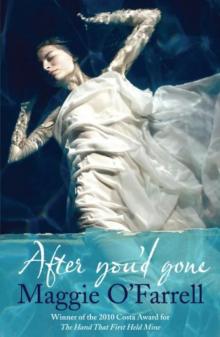 After You'd Gone
After You'd Gone The Hand That First Held Mine
The Hand That First Held Mine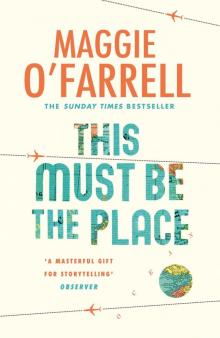 This Must Be the Place
This Must Be the Place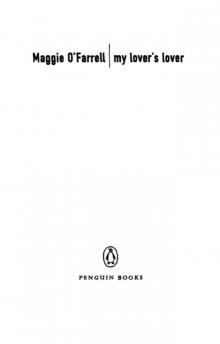 My Lover's Lover
My Lover's Lover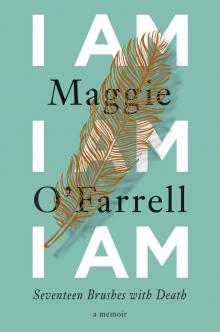 I Am, I Am, I Am: Seventeen Brushes With Death
I Am, I Am, I Am: Seventeen Brushes With Death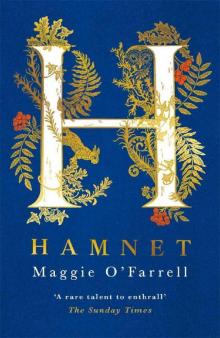 Hamnet
Hamnet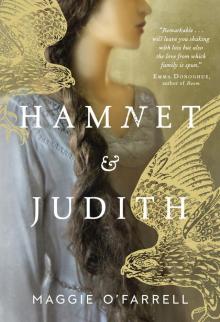 Hamnet and Judith
Hamnet and Judith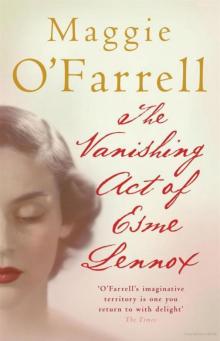 The Vanishing Act of Esme Lennox
The Vanishing Act of Esme Lennox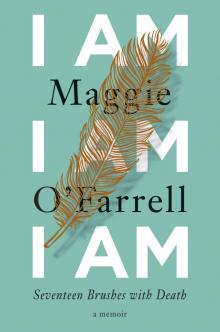 I Am, I Am, I Am
I Am, I Am, I Am